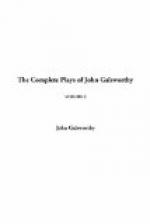Enid. [Moving to the double-doors, and listening.] Do you know that man Roberts, Frost?
Frost. Yes, M’m; that’s to say, not to speak to. But to look at ’im you can tell what he’s like.
Enid. [Stopping.] Yes?
Frost. He’s not one of these ’ere ordinary ’armless Socialists. ’E’s violent; got a fire inside ’im. What I call “personal.” A man may ’ave what opinions ’e likes, so long as ’e ’s not personal; when ’e ’s that ’e ’s not safe.
Enid. I think that’s what my father feels about Roberts.
Frost. No doubt, M’m, Mr. Anthony has a feeling against him.
[Enid glances at
him sharply, but finding him in perfect
earnest, stands biting
her lips, and looking at the
double-doors.]
It ’s, a regular right down struggle between the two. I’ve no patience with this Roberts, from what I ’ear he’s just an ordinary workin’ man like the rest of ’em. If he did invent a thing he’s no worse off than ‘undreds of others. My brother invented a new kind o’ dumb-waiter—nobody gave him anything for it, an’ there it is, bein’ used all over the place.
[Enid moves closer to the double-doors.]
There’s a kind o’ man that never forgives the world, because ’e wasn’t born a gentleman. What I say is—no man that’s a gentleman looks down on another because ’e ’appens to be a class or two above ’im, no more than if ’e ’appens to be a class or two below.
Enid. [With slight impatience.] Yes, I know, Frost, of course. Will you please go in and ask if they’ll have some tea; say I sent you.
Frost. Yes, M’m.
[He opens the doors
gently and goes in. There is a momentary
sound of earnest, gather
angry talk.]
Wilder. I don’t agree with you.
Wanklin. We’ve had this over a dozen times.
Edgar. [Impatiently.] Well, what’s the proposition?
Scantlebury. Yes, what does your father say? Tea? Not for me, not for me!
Wanklin. What I understand the Chairman to say is this——
[Frost re-enters closing the door behind him.]
Enid. [Moving from the door.] Won’t they have any tea, Frost?
[She goes to the little
table, and remains motionless, looking
at the baby’s
frock.]
[A parlourmaid enters from the hall.]
PARLOURMAID. A Miss Thomas, M’m
Enid. [Raising her head.] Thomas? What Miss Thomas—d’ you mean a——?
PARLOURMAID. Yes, M’m.
Enid. [Blankly.] Oh! Where is she?
PARLOURMAID. In the porch.
Enid. I don’t want——[She hesitates.]
Frost. Shall I dispose of her, M’m?
Enid. I ’ll come out. No, show her in here, Ellen.




